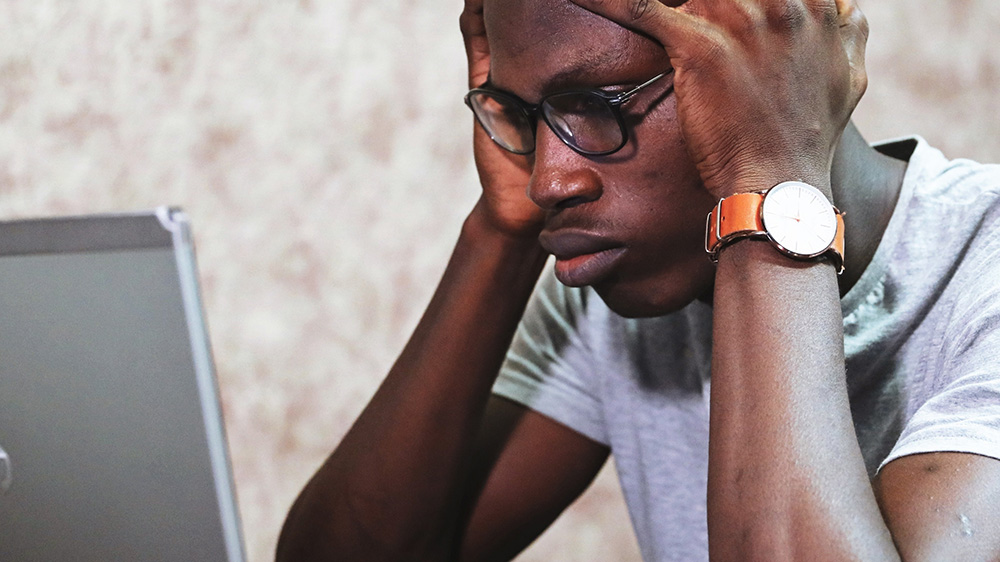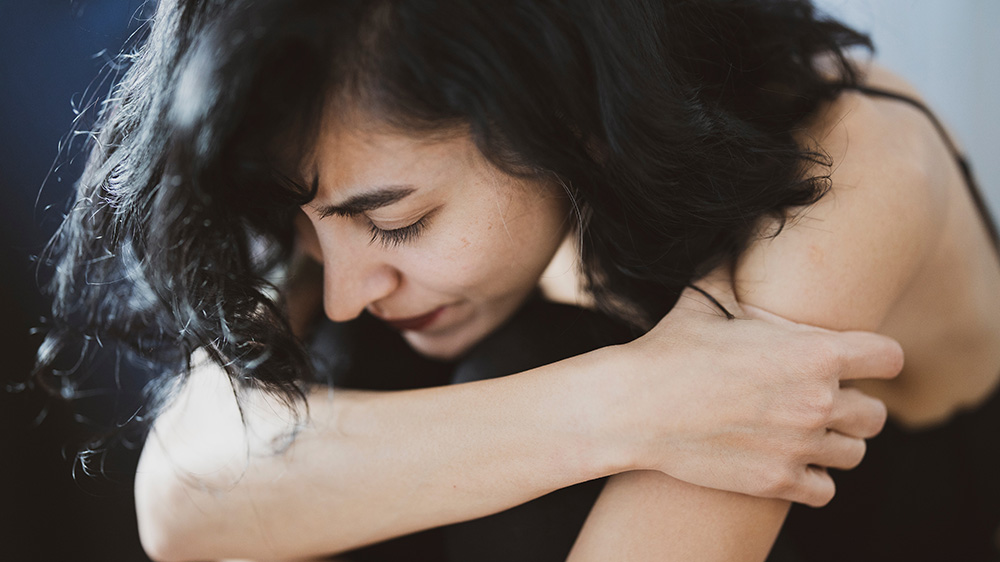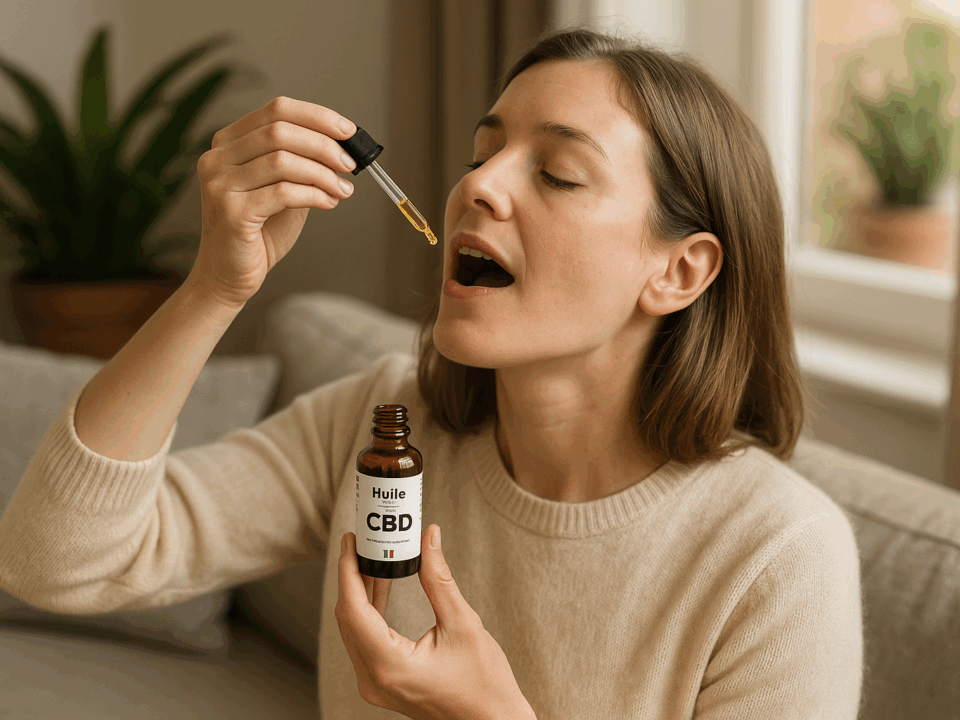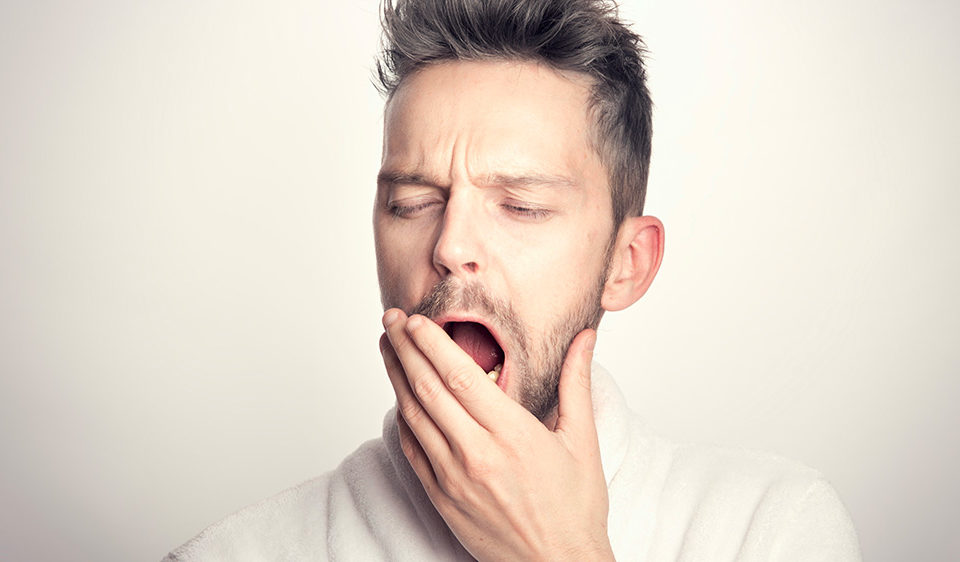
Dosage of CBD oil: what dosage is needed to feel the effects?
July 6, 2023
CBD oil: a help to stop smoking tobacco
July 6, 2023CBD oil won't get rid of your anxiety or stress with a wave of a magic wand. Nevertheless, thanks to its affinity with certain neurotransmitters in the brain, coupled with its regulating action, this cannabis-derived molecule could help you restore a balance synonymous with well-being and serenity.
The Nobilis team explains how and why.
Do you suffer from anxiety disorders?
Everyone is more or less subject to stress. It's a perfectly natural, even useful, emotional reaction.
Certain situations are experienced as hardships, leading to a feeling of danger, which in turn releases adrenaline into the bloodstream. Heart rate accelerates. You sweat excessively. You feel sick to your stomach, you can't sleep and you have difficulty thinking straight.
In short, we're stressed. It's unpleasant, yes. But it's temporary: as soon as the stressful situation has passed, you're back to normal.
The 6 subtypes of anxiety disorders
- Generalized anxiety
- Panic disorder: sudden onset of irrational fear of death or loss of self-control;
- Specific phobias: excessive fear of an object, material or animal;
- Agoraphobia: fear of public spaces;
- Social anxiety: fear of public speaking, talking with people ;
- Separation anxiety: fear of losing a loved one(s).
Whatever the anxiety disorder, symptoms are diverse and varied [2], ranging from chronic fatigue and dizziness to high blood pressure, recurrent headaches, digestive problems and difficulty concentrating.
Good to know:
If you think you're suffering from anxiety, don't hesitate to consult a specialist, as this condition can lead to depression or cause serious health problems.
Does CBD oil act as a natural anxiolytic?
Anti-anxiety treatments based on antidepressants or tranquilizers are sometimes necessary. However, in view of the side effects, many people feel that this is not an appropriate long-term solution.
In this sense, CBD appears to be an interesting option. Indeed, the WHO has declared it safe and free of side effects, and as we shall see, studies tend to show that CBD can indeed help combat anxiety.
However, if you are undergoing treatment, or being monitored, talk to your therapist.
What are anxiolytics: how do tranquilizers work?
Before finding out whether CBD can act as a natural anxiolytic, let's take a quick look at how such a drug works.
There are two types of anxiolytic [3]: benzodiazepines and non-benzodiazepines. Both are tranquilizers whose sedative action reduces stress and anxiety. However, their mode of action is different:
- Benzodiazepines (tranquilizers) increase the activity of the neurotransmitter GABA, a soothing, relaxing chemical. They are fast-acting, and are prescribed for occasional relief of anxiety, stress or even epileptic seizures. These anxiolytics must be used with great care, as they are highly addictive;
- Non-benzodiazepines (antidepressants, or 5HT1a agonists) inhibit the reuptake of serotonin (SRI), the happiness hormone. It takes 2-6 weeks to feel the effects, but it is currently the only background treatment available for people with anxiety and/or depression (70-80% of anxious people are at risk of developing depression).
In both cases, the side effects are numerous: drowsiness, libido problems, difficulty concentrating, irritability, amnesia, dizziness, coordination problems and so on. [4] Hence the growing interest in CBD and other natural anxiolytics among anxiety sufferers.
CBD's anti-stress and calming action
Just as traditional anxiolytics do, CBD is also thought to act on brain chemistry, notably on the neurotransmitters responsible for serotonin reuptake, 5-HT1A [5].
Simply put, CBD prevents your brain from reabsorbing serotonin, the hormone that triggers feelings of well-being and joy. This action is fast-acting, and the effects can be felt within minutes of taking CBD.
CBD is also said to be an agonist of GABA neurotransmitters, which induce a state of serenity. This mechanism is not unlike that of benzodiazepine anxiolytics, which also act on the synthesis of GABA neurotransmitters.
In fact, according to a 2017 study [6], CBD acts on a subtype of this neurotransmitter, and does not act on the same benzodiazepine sites. This is why, despite its calming action, CBD is not habit-forming .
CBD and anxiety-induced symptoms
As we've already mentioned, chronic stress significantly reduces quality of life. Indeed, sufferers experience sleep disorders, fatigue, difficulty concentrating, mood swings and even depression.
CBD offers a complete solution. In addition to the aforementioned effects on serotonin levels, CBD is also involved in our overall state of health, thanks to its affinity with our endocannabinoid system (ECS).
The endocannabinoid system is a vast network of neurotransmitters whose purpose is to maintain the body in a state of homeostasis, or equilibrium. To regulate our biological functions, the body synthesizes its own cannabinoids, anandamide and AG-2. Together, they ensure that the hormonal, metabolic and digestive systems function in the best possible conditions.
For genetic or environmental reasons, the ECS may not produce enough endocannabinoids. Some doctors, such as Dr. Ethan Russo, believe that this deficiency could be at the root of various everyday ailments such as insomnia, lack of energy, chronic pain, digestive disorders and so on. [7]
Taking CBD oil on a regular basis could help restore the functioning of the ECS, and thus promote optimal health. In this way, people suffering from anxiety could improve their daily lives and feel more serene.

How to consume CBD oil to reduce stress and anxiety?
This cannabis extract is sold in all forms, nevertheless CBD oil proves to be one of the best ways to fight anxiety, because :
- It's a convenient and discreet way to consume CBD;
- Numerous concentrations of CBD are available, making dosage easy;
- And there's a wide variety of CBD oil, with formulas to suit every need.
That said, there are several criteria to consider when choosing your CBD anti-anxiety oil.
CBD concentration: finding the right anti-stress dosage
We all react differently to cannabinoids! The best way to find out what dose of CBD will help you reduce stress and anxiety is to start with a small dose and gradually increase until you get the results you're looking for.
All CBD products are sold in different concentrations. Start with a low level of CBD: between 5% and 10%, at 2 to 3 drops a day. Increase the number of drops every 3 days as you feel the effects. If you don't feel any effects, switch to a higher concentration.
Finding the right dosage of CBD can take time. Be patient and don't hesitate to ask for advice. For example, our team will be delighted to guide you through the process.
The right composition: full spectrum or not?
If you've ever browsed the catalog of a CBD store, then you've probably come across the terms "full spectrum" and "broad spectrum", especially if you're looking for CBD oil.
- Full spectrum CBD oils contain ALL the molecular baggage of cannabis flowers. In other words, they contain a little THC (less than 0.3%) as well as terpenes;
- Broad-spectrum CBD oils contain ALMOST all the molecular baggage of cannabis, with the exception of THC.
One is not necessarily better than the other; it's a strictly personal choice. Some people don't want to come into contact with THC at all - that's their choice. Even so, it's worth bearing in mind that 0.3% THC is far from sufficient to cause any psychotropic effect.
At Nobilis, we offer a third type of CBD oil. These are known as "innovative" oils, because their composition is specially designed to treat a particular symptom.
In the case of anxiety, for example, we have designed a formula with a high concentration of CBD, as well ascannabinol (CBN), a cannabinoid known for its calming and anti-stress effects.
Quality!
It goes without saying that the effectiveness of CBD in combating anxiety (and any other ailment) is directly linked to the quality of the product you buy.
But ... how do you recognize a good quality product? Well, there are a few factors to consider when sourcing a product:
- First of all, prefer French brands that work with cannabis grown in France. As well as being good for the environment in terms of carbon footprint, this guarantees that the flowers used have not undergone any extra treatment (washing is sometimes practised when the THC content of imported flowers is higher than the level tolerated in France);
- Then, even if there isn't really an organic label for CBD products, try to find out about them, and choose organically grown products;
- Finally, make sure that the product is free of harmful solvents and actually contains the advertised level of CBD. For this, ask for laboratory analysis.
At Nobilis, we're proud of our products and the way they're made. Read our story to find out more.
CBD dosage for anxiety: when and how often?
One question that often comes up concerns dosage: when and how often should you take your CBD oil to feel its tranquilizing effects?
First of all, it's important to know that there are no official rules regarding the duration, frequency and dose of CBD oil you should take to combat your anxiety. In fact, CBD-based products are not considered medicines.
We've seen that the ideal dose of CBD depends on each individual and that you'll need to be patient to find the right dosage. The same goes for frequency of use, in the sense that it depends on you, on what works for you.
Some people feel anxious first thing in the morning. Others, more occasionally, before an important event, for example. While it's also common for stress accumulated over the course of the day to keep you awake at night.
You can also take 3 drops 3 times a day, if you feel anxious all day long. Just as you can take your daily dose only in the morning, or only in the evening. It's up to you to test and find out what works for you.
In any case, we repeat, our team is available if you need advice, even if we can never replace a medical professional.
Good to know:
👉 It's very difficult, if not impossible, to overdose on CBD. In fact, studies have shown the absence of serious side effects up to 1500 mg of CBD, the equivalent of 10 bottles of CBD oil.
Sources
[1] "When anxiety becomes pathological", Inserm, 02/03/2021
[2] "About anxiety disorders", Quebec, 10/25/2019
[3] "Anxiety medications", Vidal, 01/12/2021
[4] "Anxiolytics, the essential points", PharmacoMedical, 30/05/2018
[6] "The direct actions of cannabidiol and 2-arachidonoyl glycerol at GABA A receptors", PubMed
[7]" Clinical Endocannabinoid Deficiency Reconsidered: Current Research Supports the Theory in Migraine, Fibromyalgia, Irritable Bowel, and Other Treatment-Resistant Syndromes" Dr. Ethan Russo.





